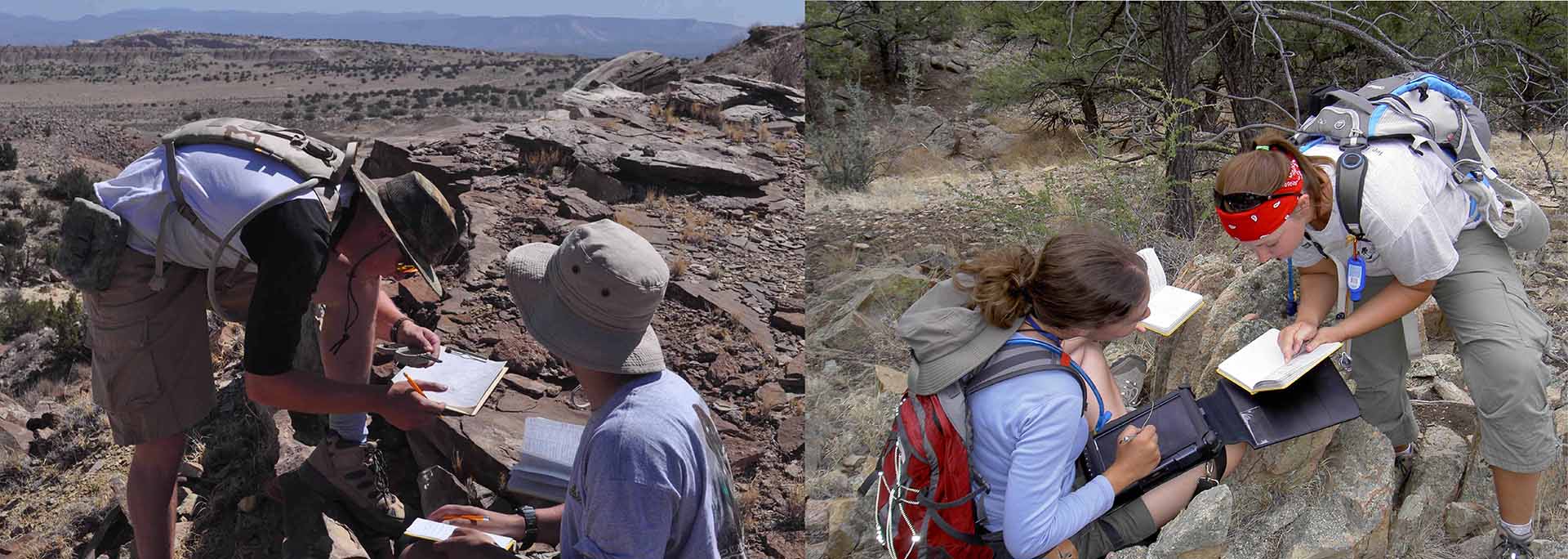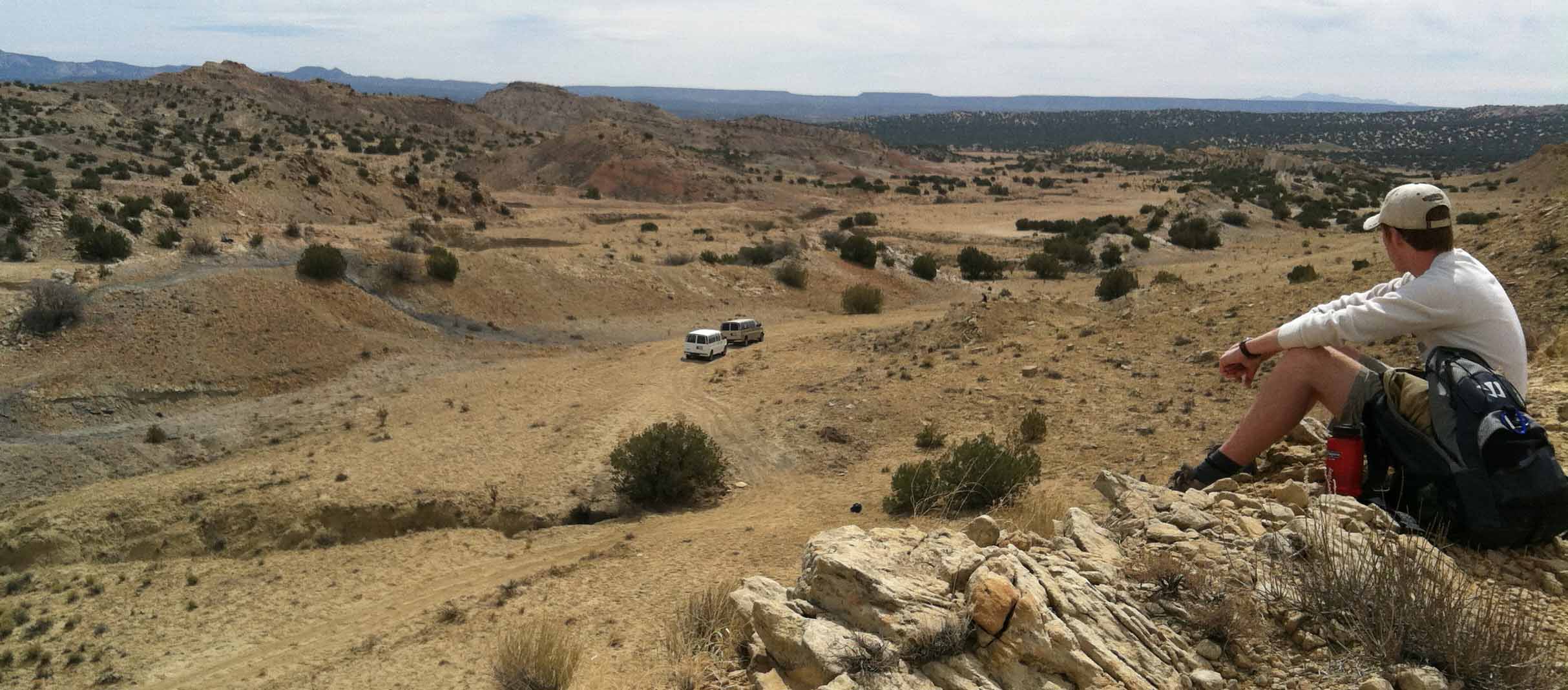Geology Field Course
Summer 2026 (May 25 - Jun 21)
Our field course exposes students to a variety of geological settings and applications, integrating the latest technology in field mapping. In our 2006 field course, we introduced the use of ruggedized tablet computers with wireless GPS receivers for field mapping and data collection. The purpose of using digital technology is to enhance the basic skills necessary for fieldwork while bringing students to the forefront of the digital revolution.
More Information
OVERVIEW
Portable computers, Global Positioning Satellite (GPS) receivers, and Geographic Information Systems (GIS) are changing the way field geology is done. In response to the changing demands on Geologists today, we have revised our field course curriculum to integrate new technologies with traditional field methods. The course will teach students how GPS navigation and digital mapping and data analysis using GIS can facilitate field work and improve the understanding of the geology. Working with sedimentary, metamorphic, and igneous rocks, students learn how to make methodical observations, accurate recordings, and sound interpretations of the geology seen in outcrop. Exercises include measuring and analysis of sedimentary sections, construction of geologic maps, structural analysis of folds and faults, slope stability analysis, and environmental assessments. Students will learn to use Brunton compasses, laptop and ruggedized tablet PC computers, GPS receivers, aerial photographs, topo maps, satellite images, and GIS databases in their projects. Field areas are in the Basin and Range, Colorado Plateau, and Rocky Mountain provinces. Geologic features to be examined are folded and faulted sedimentary strata of Paleozoic and Mesozoic age, regional metamorphic facies in Precambrian rocks, Cenozoic volcanism, pegmatites and plutonic rocks of Precambrian age, and Quaternary glacial deposits. Environmentally-related projects include slope stability analysis and environmental site assessments. Work to be submitted for evaluation includes field notebooks, field maps, drafted geologic maps and structure sections, and interpretative reports.

THE CAMP
Students will be housed in the dormitories at Ft. Lewis College in Durango, Colorado for two weeks of the course and in a private lodge in Nathrop, Colorado for one week. There will be approximately ten nights of camping near Albuquerque and Jemez Mountains, New Mexico and in Colorado. The course is rigorous, both physically and academically. Field work will be carried out in a variety of environments ranging from desert to mountainous terrain at elevations up to 11,000 feet. Field work will normally be conducted six days per week. Organized activities, such as mountain climbing, mineral collecting, a narrow-gauge train ride, and white-water rafting are available on days off.
Housing
During our stay in New Mexico, we will be camping. Each student must provide his or her own tent, sleeping bag and air mattress as well as personal items such as towels and soap. The field course provides stoves, coolers, lanterns, and utensils for cooking and eating. In Nathrop, we will be staying in a private lodge which has sleeping mattresses, but you will need your sleeping bag and towels. While at Ft. Lewis College, we will be staying in a campus dormitory. Linens and blankets will be furnished. The campus is located within walking distance of the downtown area of Durango. On the drive out and back, motel accommodations will be provided at no cost to the student.

Meals
All meals while at the field camp, except three dinners, are covered by the program fee. While camping and staying in Nathrop, cooking and eating will be done on a communal basis. Everyone is expected to contribute his/her share of the chores such as cooking, washing dishes, and keeping the camp clean. Most duties are assigned on a rotating basis. Each person will be responsible for preparing his or her own lunch for the day. At Ft. Lewis College, most dinners will be taken in the campus cafeteria. Meals in Bowling Green and during travel to and from BGSU to the field camp are not covered.
Transportation
Travel will be in university-owned 15-passenger vans occupied by no more than 10 persons. At least one staff member or one graduate assistant will be in each van at all times. Additional rental vehicles may be employed. Vehicles will be operated only by designated drivers cleared by the university's risk management office. Students will not be permitted to drive the vans for personal use for reasons of cost, liability, and insurance. All routine transportation costs are included in the course fee.

QUESTIONS
Questions concerning the field course and paper copies of the application form may be obtained from or addressed to:
Dr. Yuning Fu, Field Course Director
190 Overman Hall
Bowling Green State University
Bowling Green, OH 43403
(419) 372-3235
E-mail: yfu@bgsu.edu
Updated: 12/01/2025 11:23PM
